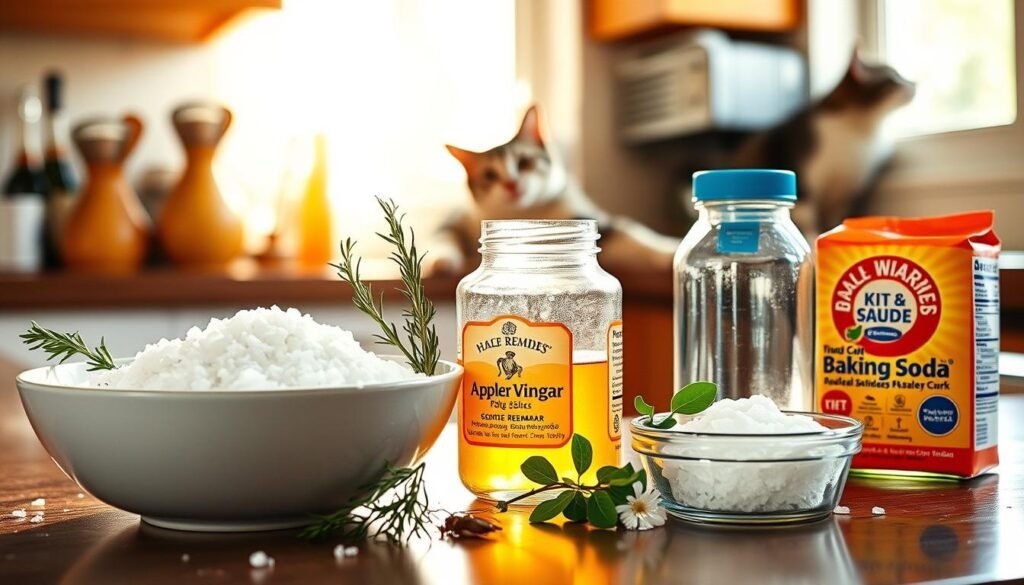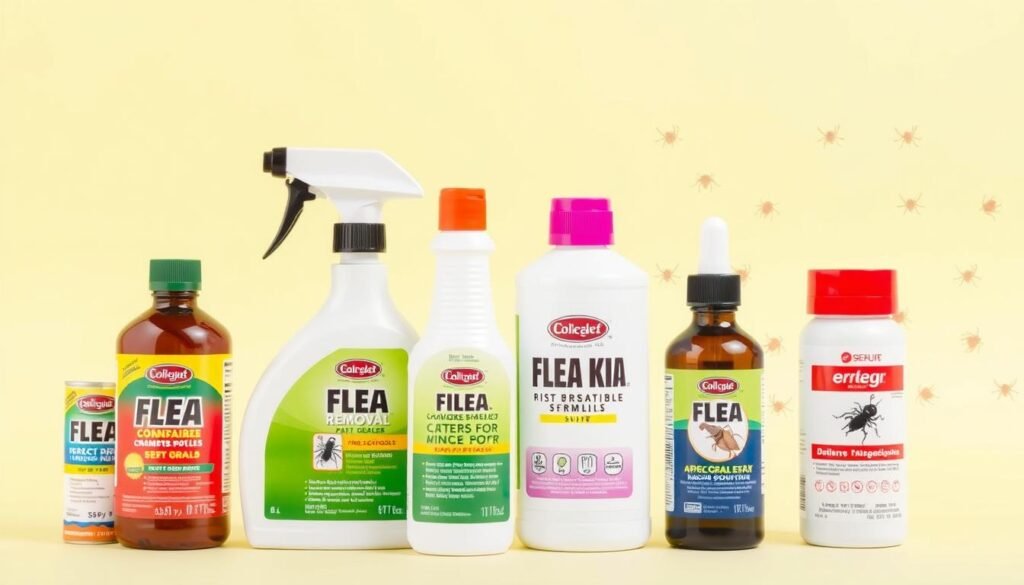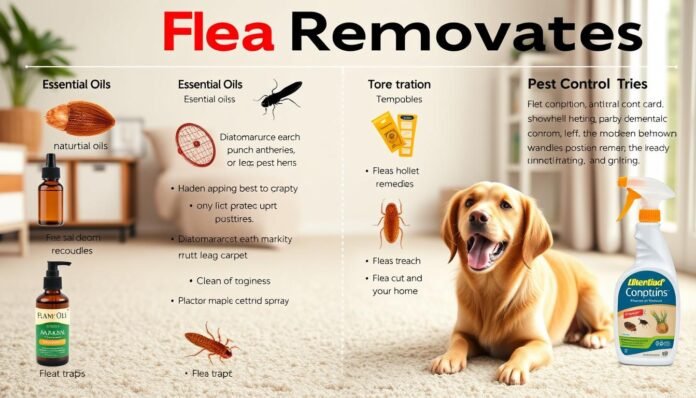Fleas can turn homes into uncomfortable spaces for people and pets. It’s vital to find good flea removal methods to keep living areas clean and cozy. These small pests are found everywhere, making it hard but necessary to control them. In this piece, we’ll cover the flea’s lifecycle, how to prevent them, and how to get rid of them. Knowing about these pests helps you handle flea problems more effectively.
Key Takeaways
- Flea infestations can significantly impact the well-being of pets and humans alike.
- Effective flea removal strategies are crucial to maintaining a pest-free home.
- Understanding flea behavior and lifecycle enhances pest control efforts.
- Preventive measures can significantly reduce the likelihood of infestations.
- There are various techniques, both natural and chemical, for effective flea removal.
Understanding Fleas and Their Lifecycle
Fleas are tiny, wingless bugs that quickly become a problem, especially for people with pets and homes. Knowing the signs of fleas is the first step to control them. Also, understanding how fleas grow helps a lot in stopping and dealing with them.
Common Signs of a Flea Infestation
To act quickly, you must spot a flea problem early. Here are some typical signs of fleas:
- Itching: Pets might scratch a lot, showing they’re bothered by flea bites.
- Flea Bites: People can get bites too, which look like red, itchy spots.
- Flea Dirt: You might see tiny black specks on pets or their beds.
The Lifecycle of Fleas: What You Need to Know
It’s key to know about the flea lifecycle to understand how infestations start. Fleas go through four stages:
| Stage | Description | Duration |
|---|---|---|
| Egg | Females lay tiny eggs in places like pet beds. | 2 days to 2 weeks |
| Larva | Larvae hatch from eggs and eat organic stuff. | 5 to 20 days |
| Pupa | Larvae make a cocoon and change into the pupal stage. | 1 week to several months |
| Adult | Adults come out of cocoons, ready to eat and reproduce. | Varies; can reproduce quickly |
Knowing the signs and how fleas grow is key to spotting and controlling them. Acting fast can stop fleas from becoming a big problem.
Preventive Measures to Avoid Flea Infestation
Keeping your home flea-free is crucial for your pets and family’s comfort. You can cut down on flea risks with a few steps. Clean homes and good pet grooming are very important.
Maintaining Clean Environments
Cleaning well is a top way to avoid fleas. Vacuuming catches fleas and their eggs before they grow. Always wash pet beds in hot water to get rid of pests. Cleaning floors and furniture keeps flea larvae away. A regular clean-up makes your home unattractive to fleas.
Pet Grooming Tips to Keep Fleas Away
Grooming your pet is key in flea control. Brushing often helps spot fleas early and controls fur shedding. Use vet-recommended flea treatments during grooming. Regular baths with the right shampoo keep your pet clean and flea-free.
Initial Steps for Fleas Removal
To fight a flea problem, acting fast is key. The first step is finding where the fleas are coming from. This helps target and get rid of the pests effectively. Fleas can come from pets, certain pieces of furniture, or even outside. If you are looking for the best Website, you can Visit here for more information: 除跳蚤
Once you know the source, you can plan how to remove the fleas thoroughly.
Identifying the Source of the Infestation
Start by checking your pets. Fleas like to hide in their fur, especially near the neck and tail. Grooming your pets often can reveal fleas.
Then, check your home. Look where your pets hang out, like on carpets, in beds, and under furniture. Don’t forget to check outside, like in your yard, since fleas can live there too.
Immediate Actions to Take
After finding the infestation, act quickly. Use flea treatments recommended by your vet on your pets. Vacuum carpets and furniture well to get rid of fleas and their eggs.
Wash any bedding or clothes that are infested in hot water right away. Taking these steps solves the current problem and stops more fleas from coming.
Effective Flea Removal: Home Remedies
Many pet owners look for ways to get rid of fleas safely. Home remedies are great because they’re natural and pet-friendly. Try these natural options to protect your pets.
Natural Solutions for Flea Control
Some easy-to-find ingredients can fight off flea invasions at home. Let’s look at a few natural remedies that work well:
- Vinegar: Mixing vinegar with water and spraying it on your pet’s coat can keep fleas away. The acidity doesn’t let fleas stick around.
- Lemon Juice: Fleas dislike the smell of citrus. Putting lemon juice in your dog’s bath water may help fend off fleas.
- Diatomaceous Earth: Sprinkle this powdery substance on carpets and bedding. It kills fleas by drying them out.
Using Essential Oils Safely
Essential oils like lavender and cedarwood can help, too. They smell nice and work against fleas. But you must use them the right way to keep pets safe:
- Dilute essential oils before putting them on your pet. Mix one or two drops with a carrier oil.
- Test a small amount on your pet’s fur first. This checks for bad reactions.
- Make sure your pet never eats the oils. They can be harmful in large amounts.

Natural and essential oil remedies are both safe and effective for flea control. With these methods, you can create a flea-free space naturally.
Pest Control Options for Flea Removal
Dealing with flea infestations involves knowing your options. Homeowners can choose expert help or DYI remedies for milder problems. Both choices offer benefits, tailored to fit the situation perfectly.
Professional Pest Control Services
Professional services provide deep cleaning against fleas, great for big invasions. Experts assess the issue and use specific treatments. This gets rid of fleas at every stage. The process usually involves:
- Thorough inspection of the premises
- Application of specialized insecticides
- Follow-up visits to monitor and treat any remaining pests
Choosing professionals can give fast and lasting results. It lets homeowners quickly get their spaces back from these annoying pests.
DIY Pest Control Techniques
DIY methods fit if you like solving problems yourself. It’s good for small flea issues without needing outside help. Some common methods are:
- Using store-bought flea sprays that target adult fleas and larvae
- Setting up flea traps using soapy water as an attractant
- Implementing vacuuming routines to eliminate eggs and larvae
This knowledge lets homeowners handle slight flea issues on their own. They can see if they need more extreme solutions later.
Understanding Insecticides and Their Use
Insecticides are key in getting rid of fleas effectively. It’s important to know about the different insecticides you can use. Knowing how to use these products right is crucial for safety and success.
Types of Insecticides for Flea Removal
There are a few insecticides made just for fighting fleas. Some popular kinds include:
- Topical Treatments: Applied directly to pets, these insecticides kill fleas upon contact.
- Sprays: These are versatile products that can be used both indoors and outdoors, targeting fleas in various environments.
- Foggers: Ideal for large areas, foggers disperse insecticides throughout a space, reaching areas we can’t see.
Application Tips for Maximum Effectiveness
For the best results, keep these tips in mind when applying insecticides:
- Read the Label: Always follow the manufacturer’s instructions to ensure safety and effectiveness.
- Choose the Right Time: Apply insecticides when pets and people can remain out of the treated area for a safe duration.
- Use Protective Gear: Consider wearing gloves and masks during application to avoid inhalation and skin contact.
- Target Critical Areas: Focus on areas known for flea activity, like pet bedding, carpets, and cracks in flooring.

Using these strategies helps you pick the right insecticides. It also makes flea control more effective.
The Role of Flea Collars and Flea Shampoo
It’s key to know how vital flea collars and shampoos are in flea defense. They keep pets safe from bugs and cozy. Picking the right items means thinking about your pet’s health and needs.
Choosing the Right Flea Collar for Your Pet
Picking a flea collar means considering a few things. There are various sizes and types to fit all pets. Aim for collars with effective ingredients like imidacloprid or flumethrin. They protect for a long time. Keep these tips in mind:
- Pet Size: The collar should fit well but not be too tight.
- Health Conditions: Talk to your vet about any allergies or health concerns.
- Longevity: Look for collars that guard your pet for months up to a year.
Benefits of Using Flea Shampoo
Flea shampoo does two things well: it soothes itching and kills adult fleas. Using it can drop flea counts fast. Here are some benefits:
- Fast Action: It quickly eases the itch and discomfort from flea bites.
- Deep Cleaning: Cleans out dirt, oils, and flea leftovers from the fur.
- Additional Ingredients: Often has aloe or oatmeal to soothe the skin.
Flea Combs: A Useful Tool for Pet Owners
If you’re dealing with fleas on your pet, a flea comb is a must-have. This tool not just captures fleas but also their eggs during grooming. For best results, use it often in your pet care routine. Gently comb your pet’s fur, paying extra attention to areas fleas love, like behind the ears and near the tail.
How to Use a Flea Comb Effectively
Make sure your pet is relaxed before you start. Begin combing at the neck, moving down the body in small sections. As you comb, look for fleas or their debris caught in the comb. After each stroke, dip the comb in soapy water to kill the fleas. Doing this regularly helps keep your pet flea-free and comfortable.
What to Look for When Buying a Flea Comb
Choosing the right flea comb matters for effective grooming. Teeth spacing is key—the closer, the better for capturing fleas. You want a comb that’s durable yet gentle on your pet. Some have ergonomic handles for easier use. A good buying guide can direct you to the best flea comb for your pet, making it a vital part of fighting fleas.

